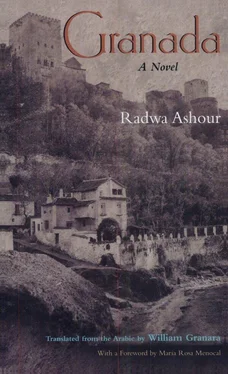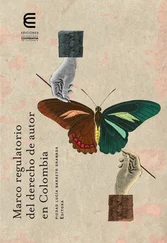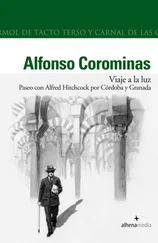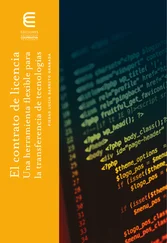Radwa Ashour - Granada
Здесь есть возможность читать онлайн «Radwa Ashour - Granada» весь текст электронной книги совершенно бесплатно (целиком полную версию без сокращений). В некоторых случаях можно слушать аудио, скачать через торрент в формате fb2 и присутствует краткое содержание. Год выпуска: 2003, ISBN: 2003, Издательство: Syracuse University Press, Жанр: Современная проза, Историческая проза, на английском языке. Описание произведения, (предисловие) а так же отзывы посетителей доступны на портале библиотеки ЛибКат.
- Название:Granada
- Автор:
- Издательство:Syracuse University Press
- Жанр:
- Год:2003
- ISBN:9780815607656
- Рейтинг книги:5 / 5. Голосов: 1
-
Избранное:Добавить в избранное
- Отзывы:
-
Ваша оценка:
- 100
- 1
- 2
- 3
- 4
- 5
Granada: краткое содержание, описание и аннотация
Предлагаем к чтению аннотацию, описание, краткое содержание или предисловие (зависит от того, что написал сам автор книги «Granada»). Если вы не нашли необходимую информацию о книге — напишите в комментариях, мы постараемся отыскать её.
Granada — читать онлайн бесплатно полную книгу (весь текст) целиком
Ниже представлен текст книги, разбитый по страницам. Система сохранения места последней прочитанной страницы, позволяет с удобством читать онлайн бесплатно книгу «Granada», без необходимости каждый раз заново искать на чём Вы остановились. Поставьте закладку, и сможете в любой момент перейти на страницу, на которой закончили чтение.
Интервал:
Закладка:
At the Bunoud Gate the crowd formed a circle around the returning men to hear what happened and to ask questions.
“We pelted his house with stones and hurled a slew of insults.”
“Why didn’t you break into the residence?”
“Believe me, we tried. But the gates were impenetrable and the house is like a fortress.”
“How about the windows?”
“We managed to smash the glass out of all of them, and the pieces came crashing down right before our eyes.”
“And that dog didn’t show his face?”
“Never! He stayed inside like a bat in his cave, so we decided to surround the palace until hunger and thirst forced him to come out.”
“So, what happened and why did you come back?”
“The Castilian army surrounded us. They far outnumbered us, and they were armed and we weren’t. Then we huddled in consultation. Should we take them on and fight, putting ourselves in God’s hands and die as martyrs, or is there an alternative? When Count Tendilla appeared on his magnificent, ashen-colored stallion, he dismounted and shouted in a loud, forceful voice, ‘Who represents you? It is only your leader I will address.’
“No one among us responded, since we all came together, and there was neither a leader nor a follower amongst us. When he repeated the question, four of the men stepped forward and approached him. They listened to what he had to say, and they came back. They told us he asked them to lift the blockade from the cardinal’s residence at once. He said, ‘I personally will go to Albaicin tomorrow and speak with your comrades, and I will put an end to this problem.’
“We told him we would hold our ground until he departed, and that if our leaders responded favorably, and if he acceded to their demands, then we would lift the blockade from the cardinal’s residence. The four men conveyed our message to him and came back with his reply:‘Either you lift the blockade first, or else we will remove you by force. You’re nothing but a little gang of unarmed men. And here you see our troops, horsemen, and foot soldiers, armed to the teeth.’
“We consulted with one another and decided to end the blockade. Did we make a mistake?”
It was Saad who had accompanied the young men to the cardinal’s residence and it was he who asked this question, “Did we make a mistake?” Nobody dared answer even though their eyes responded with bewildered glances.
At that moment the children who had climbed the walls and towers erupted in shouts when they spotted a battalion of the Castilian cavalry approaching the gates of the city. The air grew tense and everyone turned to thoughts of what he had to do. Some of them fortified the barricades, and some rolled out the weapons. Others, like Naeem, climbed the walls carrying stones and insults that they would hurl at those bastard sons who wanted to attack the quarter. Stones and curses came flying in every direction, and the knights who were able to protect themselves from them and arrive safely to the gates found them bolted shut. Drawing together on their horses and forming a circle, they withdrew amidst the shrill clamor that mixed shouts of anger, cries of joy, insults, spitting, and praise and thanks to God.
Another restless night passed in Albaicin, oscillating between slumber and sleeplessness, between hard work and a grueling silence. The forty men elected to put Albaicin’s affairs in order never had the chance to shut an eye, much less even think about it. They spent the night deliberating over what they would say to Count Tendilla if he came to negotiate as he had promised, or what they would do if the Castilian army attempted an assault on the quarter. They also had to manage the affairs of a hundred thousand citizens of Albaicin, and in the event of a siege that could last several weeks or months, would there be enough flour and grain to feed them? Since the road to the Darro was cut off, would the wells discharge sufficient water? Would it be necessary to ration basic staples, or to smuggle out messages to those hiding in the mountains? How could they send messages requesting help to the North Africans and Egyptians, or to the Ottoman sultan Bayzid? In the event of an attack on the quarter and the outburst of fighting, would they open the northeast gates to let the women, children, and elderly escape and seek refuge in some faraway place, or would wisdom dictate that they remain behind the barricades under the protection of their menfolk entrenched behind the gates?
On the following day Count Tendilla arrived as promised and met with the members of the newly elected government. “Your uprising against the king and queen is an act of rebellion that will be seriously punished,” he warned.
“The conditions of the treaty that the king and queen both signed and to which they committed themselves have been violated. You force us to convert to Christianity against our will, burn our books, and molest our women,” they retorted.
“Calm down, and return to your work, and we will consider your grievances.”
“Expel Ximenes from Granada, for it is he who ordered our books to be burned and forced al-Thaghri to convert after months of torture. He is the source of all our misery. Our condition is that he must leave.”
“If you don’t open the gates, we will storm Albaicin by force.”
“Get rid of Ximenes and abide by the treaty, and the gates will be opened.”
Tendilla mounted his horse and departed, followed by his cavalry guards. A sense of relief mixed with a tinge of pride filled the crowd, for the gates of Albaicin remained closed, the barricades were still standing, and they were capable of persevering, of holding their ground without compromise.
The negotiations lasted a number of days during which Count Tendilla came back and forth several times. Then he appeared with Archbishop Talavera, the first to pass through Bunoud Gate smiling his familiar smile. Tendilla followed, and removing his skullcap and waving it in the air, the crowd began to whisper among themselves, “He wants peace.” A little boy ran over and picked up the count’s red cap and lifted it up to him. The count smiled and the little boy smiled back. The governor of Granada and the archbishop spoke with the forty officials as well as some of the leading merchants and jurists.
“Let us live in peace,” said the count. “Let this crisis pass. What you have done is not an act of rebellion against the Crown of Castile. You wanted only the implementation of the treaty, and as a concession we give you our assurances that we will abide by it.”
“From whom do we get such assurances?”
“From me, personally,” responded the archbishop.
“In what way?” they asked.
“There must be trust between us,” said Tendilla. He stood silent for a moment, then continued. “I will have my wife and children live here in Albaicin amongst you. Will this suffice as a guarantee? Then it’s settled. On this very day my family will move here to live with you, and today the gates will be opened, you will put down your weapons, and you will return to your work.”
The count, his bodyguards, the archbishop and his servants departed, and the crowd remained intact, stunned and speechless. Eventually, the news spread rapidly, and the women who hadn’t left their homes learned about it even as they kept busy feeding their babies and washing the clothes. Should they believe the count or what their own hearts were telling them? And why didn’t their newly elected government say anything? Could it be possible that Tendilla would sacrifice his own wife and children? The man must be trustworthy, yet their hearts were needlessly aflutter with doubt.
The treaty was ratified, and the doors of the abandoned palace next to the Albaicin Mosque were swung open to let in the fresh air and sunshine. The huge, spacious rooms witnessed a frantic hustle in preparation for the arrival of the count’s family. Yet, in spite of it all, the gleam had been extinguished from the people’s eyes and the grimaces on their faces expressed the tension they felt as they made no effort to hide or remove the gloom permeating their souls. The young men began to take down the barricades and remove the huge bolts off the gates. The high-pitched squeaking of the bolts sent a shiver to their souls, and the droning sound of the opening gates only added to their inner turmoil.
Читать дальшеИнтервал:
Закладка:
Похожие книги на «Granada»
Представляем Вашему вниманию похожие книги на «Granada» списком для выбора. Мы отобрали схожую по названию и смыслу литературу в надежде предоставить читателям больше вариантов отыскать новые, интересные, ещё непрочитанные произведения.
Обсуждение, отзывы о книге «Granada» и просто собственные мнения читателей. Оставьте ваши комментарии, напишите, что Вы думаете о произведении, его смысле или главных героях. Укажите что конкретно понравилось, а что нет, и почему Вы так считаете.












